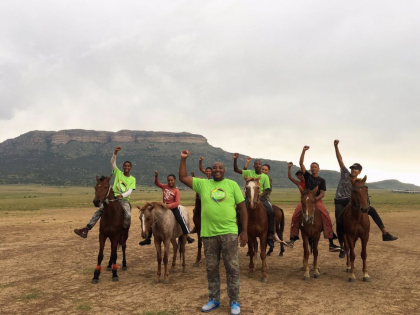The new, African magazine — for us, by us
Interview with Emmanuel Iduma, co-founder of Saraba magazine.

Emmanuel Iduma.
People often seem surprised by the art here, which is silly,” Emmanuel Iduma, co-founder of Saraba magazine with Dami Ajayi, says to me, “They wouldn’t be here if they weren’t good.” We are sitting in the cafeteria of the Bronx Museum, two blocks away from where Iduma lives. One of the installations on display, “Back Home” is a small model of a West African neighborhood store, abundant throughout New York City, and stocked with items like African Queen skin-lightening cream, Titus sardines and the iconic black and red Exeter corned beef from Brazil.
I ask him what it means to have an African magazine whose contributors and editors are spread over the globe. “I used to think that it was a limitation,” he says. “I used to think, actually a few years ago that, the only way to grow Saraba was to move back to Lagos. But now I don’t think so. I can make this scandalous claim that what we know of as African literature today is the literature that is produced in the diaspora.” He points out how Cassava Republic, a Nigeria based press, tweaked their model in establishing distribution centers in London and the US. “You already see,” he adds, “that if you are going to sell books you have to be thinking of an audience beyond the continent.”
Similar to books, magazines must go to their audience when their audience can’t come to them. And especially in Africa, people have been using magazines as spaces for radical thinking on issues and ideas for years. In his 2012 memoir In the House of the Interpreter, Ngugi Wa Thiongo, talks about Saturday Evening Paper, at Alliance High School. Students founded the publication after the school magazine was shuttered due to paper shortages during World War II. Its pages were home to satirical stories of events on campus, a popular column on the absurdism of English grammar (“If the adjectives tall and long were conjugated tall, taller, and tallest …why couldn’t good become gooder, goodest.”) and culled reports from the East African Standard on the events around the Suez Canal, independence in North Africa (Libya, Tunisia, Morocco and Sudan) and Ghana’s independence giving them reports and capturing their “imaginations as no other recent event in Africa had.”
What has changed is that the Sarabas of today have to compete with Facebook groups, WhatsApp administrators, and Instagram influencers. While Wole Soyinka is still a thought leader, online communities build more around the comment section of places like Linda Ikeji’s blog. This year the magazine launched its first print issue. But its internet roots has allowed for an openness that have limited publications in the past. Though the magazine is based in Nigeria, it serves as a home base for readers and aspiring writers across the continent and in the diaspora.
Iduma is 28 years old, unassuming and seems to meditate on the words he will pick, before he speaks.. His Nigerian accent remains undiluted despite his many travels; and here his blue long sleeves and jeans are a much better defense against the cafe’s blasting AC than my t-shirt and shorts. Iduma is also a very busy man, who, in his words, is “always trafficking through genres.” In addition to his duties as co-founder and editor of Saraba magazine, he teaches in the MFA Art Writing Program at SVA, writes for numerous publications (he has a Travelogue, “A Stranger’s Pose,” coming out next year) and worked as associate curator of Nigeria’s first pavilion at the Venice Biennale earlier this year. Being chosen as a one of the curators led him to think about structures of power and the questions about who gets to represents the country, and “what language could be used to think about this exhibition,” Nigeria’s art history and how the process of art-making in a country’s history parallel the evolution of a country.
Iduma has always wanted to be a writer. His earliest memory of writing was at the age of 6, when he tore a few pages from an exercise book, and wrote the story of the biblical character Philip who disappears after baptizing the Ethiopian in Acts. His parents, a preacher and school teacher, always knew of his interest in writing and have supported him. It would be at Obafemi Awolowo University where Iduma spent 5 years studying law that his interest in writing would crystallize into a real activity, leading him to abandon a career in law.
In the second semester of his first year, Iduma got involved with editorial work for the Christian Law Students Fellowship’s board, and by his third year, “still heavily involved in law of course,” he had become editor of the Jury Press Board writings editorials, poems and short stories as well as his column Griots every week. But by his fourth year, he was thinking about what is now Saraba.
The impulse and inspiration for a magazine came earlier, through a chance encounter with Ayobami Adebayo, (author of “Stay with Me,”) a Livingspring Christian Musical Festival event at the University. She was the first person Iduma recalls meeting who “was a writer” and not simply one of the people who liked to write occasionally. They started talking about their writing, exchanging work for critique and eventually decided to start a colloquium of new writing. Around the time the idea to start a magazine took hold, there wasn’t a great habitat of spaces for literary writing locally, Iduma recalls. In print, there was Farafina, (“Oh my God if you get published in Farafina you are a good writer”) and the short stories in the daily newspapers and Sunday newspapers. They knew of an audience of people interested in reading, and writers who would want to send in new writing and so they asked their friends to contribute. “The whole idea was to bring writers like myself together for three day workshops, workshop each other’s work,” he says.
They held the first one in a chapel space on campus, and by the third had graduated to a room at the Institute of Cultural Studies. Participants would send in short stories or poems to be printed, bound and distributed during the three workshop days. Eventually some English professors joined to help. After the workshops ended, several of the participants became friends often hanging out around Megaphone, the most popular notice board on campus, which was in the English department. Conversations with other literature lovers started shifting from books they had just finished reading, to a desire to publish. “That was the beginning of Saraba,” he says.
Somewhere on his wall at home, Iduma has a quote from Winter Vault by the Canadian writer Anne Michaels describing a man who “possessed the prescience of all men who dive into a subject without defense, and with their intuition sharpened by humility.” It is a sentiment he feels is not too many shades away from his personal philosophy and life choices. Why take the risk of going into print, I ask, when everyone else is pivoting away? The book as form is a technology he explains “the anxieties people have when they ask me why are you moving to print is that they don’t realize that the book is also an object. And just as we keep re-designing tables and chairs and figuring out how the chair is connected to a larger furniture, we can also figure out how the print book can co-exist alongside the electronic book, alongside the webpage, as part of a larger mental furniture.” He adds, “Horses are still being used. They might not be used as forms of transport, but they still exist.”
Like horses in regard to transportation, this first print issue of Saraba is a milestone for what it represents, more so than what it is going to do. The title Transitions, Iduma explains, reflects “the ambiguity of what we are doing and I am not looking to resolve that.” That it is being launched in big cities all over the world plays into “a very productive tension” of what it means to be an African today. “In terms of Saraba,” he adds “I think that we are extremely fortunate that we have a sort of editorial collective all over the world” with their editors based in New York, London Lagos, and Winnipeg.
The questions around claiming the identity of being from one place, while living elsewhere are also personal for Iduma. Even before leaving Nigeria, as an Igbo person who moved a lot within the country, he always questioned what it meant to be in the diaspora within Nigeria. The idea of being a familiar or intimate stranger is reflected in his tendency to write in the first person, as he explained to me, “because I think that there is a shared personal space that me and the reader can inhabit… even the artists I choose to write about and the images that I am attracted to, my work with the archive, all of that is still related to the question of being an intimate stranger.”
Saraba’s other legacy from the days of the colloquium, besides as a meeting place for intimate strangers, is a pedagogical project. “Our focus is squarely, actually, on working with writers at the earliest moment of their career. Which is something that we have been touting and it is becoming even more important to us.” Iduma told me, “It is not about the big names. I would rather give 200 dollars to a young writer in Nigeria to develop something extraordinary — give them the confidence in their work.” A lack of training for African writers, and an orientation towards looking for the next star writer who seem to emerge out of “nowhere” is both unsustainable and would mean “constantly thinking about our writing in relation to the west,” according to Iduma. “If you are trying to build a locality, a community, then you run into problems,” he says.
On this road to community, Saraba has built many partnerships, the most recent being a literary exchange project with the Cameroon based Bakwa magazine. Participating writers had workshops in Cameroon and will be attending the Ake book Festival in Abeokuta this month where the first print issue, Transitions will have its debut. In his personal life and work, Iduma has been thinking much about the “intersection of individual destiny and historical memory, and how that might be explored through literature and visual art.” Pick up Transitions, flip through its pages and you will see this intersection made manifest — in the rich artistry of letters and pixels — ensued on a continental level.



















